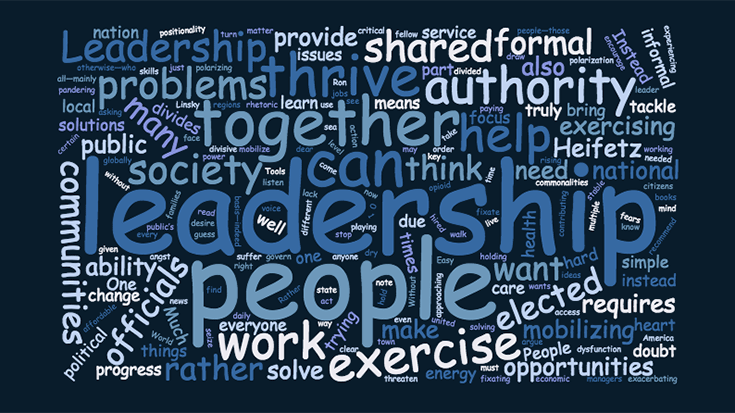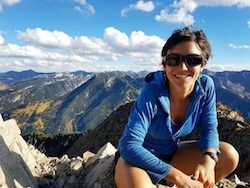By Danya Rumore for EDRBlog.org
In every challenge, there is an opportunity. There is no doubt that we live in challenging times. One need only read the national or local news to find multiple examples of societal frustration, political turmoil, ideological divides, environmental degradation, and numerous other challenges. The question is: how do we leverage the challenges we face into opportunities? More specifically, how do we seize the local, national, and international angst we are currently experiencing to better thrive as individuals, communities, states, a nation, and a global society?
 While I have few concrete answers, one thing is clear: there is currently an immense need—and an opportunity—for leadership.
While I have few concrete answers, one thing is clear: there is currently an immense need—and an opportunity—for leadership.
Leadership is, at its heart, the practice of mobilizing people to tackle tough challenges and to thrive. Building on the ideas of leadership scholars such as Ron Heifetz, I argue there is no such thing as a “leader.” Leadership is an action. All people can exercise leadership . . . or not. People can exercise leadership at some times, and not at others. Things as simple as asking a powerful question at the right time can be an act of leadership, if they help bring people together to make progress on shared issues and opportunities.
Leadership is not about having structural power or being in management positions; those are sources of authority. Similarly, trying to solve society’s and organizations’ problems by yourself is not leadership.
Get notified when new articles are posted to the EDR blog – sign up for our email list »
Instead, leadership is fundamentally about mobilizing those who are not thriving and those who must be part of the solution to do the hard work of making change—together. It demands truly trying to understand what is at the heart of the challenges that are limiting the ability of a community’s or organization’s ability to thrive, rather than assuming you know what is needed or coming in with pre-ordained solutions. This, in turn, requires approaching issues with humbleness, curiosity, and a beginner’s mind. Exercising leadership also requires helping people focus their collective efforts on “cooking the problems and not the people;” in other words, it involves marshalling people to focus their energy on addressing their shared challenges, rather than putting all of their energy into attacking and blaming each other. Further, exercising leadership requires inspiring people to individually and collectively make change, even when change is hard. One way to do this is to help people see beyond their fears and distrust to instead work together collaboratively to generate creative, innovative, and elegant solutions to shared challenges.
The skills of leadership are by no means simple. However, I believe everyone can, and arguably should, learn and exercise them.
People with formal, structural authority—such as elected officials, organizational managers and directors, educators, and technical experts—are well positioned to exercise leadership. We have authorized these people to provide us a service (elected officials, for example, are given formal authority to help the public solve its problems) and they can use this authority to help draw attention to shared challenges and the need for people to work together to address them. Much the same, people such as community organizers and key thought leaders can leverage the informal authority they have earned by being people we just think we should listen to in order to help us come together to address our shared concerns.
It is important to note that many of our formal authorities, particularly elected officials on the state and national level, are not exercising leadership. Rather than mobilizing people to work together to make progress on critical challenges such as health care, they are contributing to further divides, polarization, and positionality.
Much the same, we, the public, are playing in this political dysfunction. We are not holding our elected officials accountable to provide the service we “hired” them to provide: to govern and to work together to solve the problems of the public. Instead, we are pandering to polarizing rhetoric, divisive mechanisms, and blaming. We fixate on “how divided we are,” rather than the commonalities that united us all—mainly, our desire to thrive.
What we need now are people—those with formal authority, informal authority, or otherwise—who can help us stop fixating on how we are different and instead bring us together and mobilize us to tackle the challenges that threaten our ability to thrive. For example, I doubt many of us want anyone in our society to suffer due to a lack of affordable health care or from opioid addictions. I am confident no one wants their town to be drowned by rising sea levels or to dry up due to drought. My guess is that we all want ourselves, our families, and our friends to feel—and to be—safe as they walk America’s streets. I also think most, if not all, of us want ourselves and others to have economic opportunities and access to well paying jobs. While many of us may not think about this on a daily basis—indeed, I suspect many of us take it for granted—I am certain that most of us also want a stable democratic society that provides us the opportunity to voice our concerns, advocate for the things we think are important, and work through differences to thrive as a nation, communities, and individuals. But we cannot overcome these challenges or protect the things that are dear to us as a society without working together to do so.
I encourage everyone in America, and globally for that matter, to learn about leadership, what it means, and how to exercise it. And I challenge us all to hold ourselves and our fellow citizens accountable for exercising leadership in our neighborhoods, communities, regions, and more broadly—for being part of solving the public’s problems, rather than exacerbating them. Only then can we truly thrive as individuals, as communities, and as a society.
For more information about leadership and how to exercise it, I recommend the following books:
- Heifetz, Linsky, and Grashow (2009) The Practice of Adaptive Leadership: Tools and Tactics for Changing Your Organization and the World
- Heifetz (1998) Leadership Without Easy Answers
 Danya Rumore, Ph.D., is the current Associate Director and incoming Director of the Environmental Dispute Resolution Program in the Wallace Stegner Center at the University of Utah. She is a Research Assistant Professor in the University of Utah’s S.J. Quinney College of Law and City and Metropolitan Planning Department. She teaches about, practices, and conducts research on negotiation, dispute resolution, leadership, and collaborative problem solving.
Danya Rumore, Ph.D., is the current Associate Director and incoming Director of the Environmental Dispute Resolution Program in the Wallace Stegner Center at the University of Utah. She is a Research Assistant Professor in the University of Utah’s S.J. Quinney College of Law and City and Metropolitan Planning Department. She teaches about, practices, and conducts research on negotiation, dispute resolution, leadership, and collaborative problem solving.
